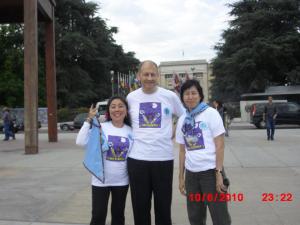Where some people go backpacking for a bit after graduation, these four young Dutch girls are looking for a larger adventure. In just over a year they will cycle from Jakarta to Amsterdam. On two tandems. And not only that, they do it for a good cause: to raise awareness for women’s rights. A ‘Ride 4 Women’s Rights.’
A few weeks after their departure from Jakarta Carlijn, Monique, Lidewij and Sophie arrived in Singapore. The Dutch girls were invited to join our Dreams Class, where we dreamed about our prospective future’s together with domestic workers staying at the HOME shelter. We found that, although the contestants came from very different countries (the Netherlands, Myanmar, Indonesia, the Philippines, India and Greece) their dreams were not that different. We all wanted to start our own companies, build our dream house and be able to take care of our loved ones. Also, visualising their own dreams helped the girls as a reminder and motivation of their road to realisation of that special dream, their ride for women’s rights.
The day after the four women cycled on, over the causeway to Malaysia, but luckily there was time for a quick interview. How did they get the idea for this challenging journey? It turned out not to be the first time these women, that have been friends since primary school, travelled together. This time they wanted to do something different. ‘It was on our last trip that we realised that students like us are very self-centered. We took all our opportunities for self-development for grated, without stopping to think how special they are. Because we are all quite sporty, we wanted to add a challenge. To be aware, for 400 days, whilst cycling, of women’s rights, will be an unforgettable exploration. So that is how we started the ‘Ride for Women’s rights.’
The four women will visit various local projects that support women’s rights, and share their stories on their website. So far the group cycled through Indonesia to Singapore, neighbouring countries but which are worlds apart. Singapore impressed them as being ‘futuristic, grand, visionary, and full of expats.’ The ladies of R4WR don’t like to judge. Their journey is one of exploration. Yet they have to admit that Singapore is more modern, and much wealthier than Indonesia. The visit to HOME showed them that ‘beneath the veneer of Singapore there is a darker area, where for instance migrants rights are not always heard.’
How does the public respond to four cycling Dutch girls? ‘When in the busy Indonesian traffic two red tandems appear, men, women as well as children laugh their heads off. There is astonishment, but we also get positive reactions, when we tell that we will cycle 14000 kilometres from Jakarta to Amsterdam to raise awareness on women’s rights. Four girls cycling? Really…from Jakarta to Rembang? O no, all the way up to Amsterdam?’ They had not expected all these positive reactions, and the sign, conversations and meetings that came forth made a lasting impression on the four.
Apart from the Far East they will cross the Middle East. All countries that are not as safe as Singapore. Are they never afraid? ‘In the Netherlands we did training on how to handle aggressive situations. This was also a prerequisite for our parents and sponsors. Safety remains very important to us. In Indonesia we often slept at police stations, a golden concept. In every town or village we’d knock on the door at the local police office. After the first week police offices started to feel like home! Every office we slept at (on our mats) would provide us with a letter of recommendation for the next one. When we arrived at the last one, in Bali, we had 17 letters. Let’s hope this trick will work in other countries too.’
After Singapore, Sophie, Carlijn, Monique and Lidewij will cycle through Malaysia, then Thailand, Cambodia, Vietnam and Myanmar before entering the Middle East. If you want to follow their adventures, do check their website at or find them on as R4WR.
And if you have any suggestions for projects to visit, or places to stay in any of these countries, don’t hesitate to drop them an email at [email protected]







